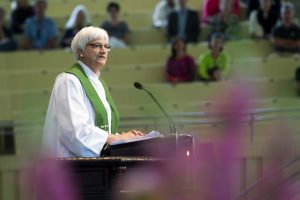
“I miss Judas from our Easter story,” said the Rev. Mary Luti. “You and I are lucky to know what Judas never got to know — love poured out of the empty tomb.”
Luti preached at the 9:15 a.m. Monday Ecumenical Service in the Amphitheater. Her sermon title was “The Power of Pardon: Easter for Judas,” and the Scripture text was John 21:1-17, the post-resurrection appearances of Jesus.
Only the gospel of Matthew has a story about the death of Judas. When he realized that Jesus had been condemned to death, he tried to return the money he had taken to betray Jesus. The authorities refused to take it back, and Judas hanged himself.
“The name Judas became a symbol for treachery and we don’t think about him,” Luti said. “We don’t dwell on the villain who rains on the Easter parade. He is the sketchy relative we don’t like to mention in front of the children. I miss Judas from our story. I think about my own betrayals, the things I can’t undo and I want to disappear. Judas never heard Christ say, ‘Peace, don’t be afraid.’ I don’t know where I would be without that peace echoing in my soul.”
If Judas had been with the other disciples, shame might not have stolen his life. Judas could have experienced Jesus coming through the walls of the upper room, walked on the road to Emmaus or been in the boat to see Jesus on the beach making breakfast.
Some of the disciples, like Peter, had gone back to their old lives, fishing.
“If Judas had been there he could have heard Jesus’ voice say, ‘Take heart, friends, try again over there,’” Luti said. “I wish Judas could cast his net into the deep water where fresh hope is waiting to be caught. He would know that only Jesus could fill the boat and his heart like that. Who else but Jesus would know that the thing to do to people who have hurt you is to feed them and say something unbearably kind?”
In John’s gospel, Jesus speaks to Peter three times. Peter might have been expecting payback for denying Jesus, but Jesus asks him, “Do you love me? Then feed my lambs.”
Jesus never said one word of recrimination to the disciples.
“Jesus spoke only love, and Judas should have been there for the most profound miracle — pardon, mercy and peace,” Luti said.
It is the human impulse to feed on grievance until the last sword has severed the last head of the last scapegoat.
“The Christian faith claimed that the resurrection ended the world of reprisal,” Luti said. “It is now structured for mercy in the image of an innocent man who gives the kiss of peace. This is a potent ethical charge; it has the power to change everything, even the church. Yet churches are struggling to survive and renew themselves. How can we be the church Jesus wanted?”
That church, she said, “is a few mortified disciples gathered around a fire they did not light, eating food they did not cook. They are inept, frightened and weak and have done the unforgivable. Any Judas should feel at home.”
The church that Jesus went through death and hell to return to is stupefied by the pardon of their blame-worthy guilt.
“That church meets blame with peace and a tender, reverent regard for the weakness of others,” Luti said.
If the church is filled with people who can make their own breakfast, who are steadfast strong and good, there will be no church.
“They won’t have a mission because they have never waited for the other shoe to drop,” she said. “They will never carry undeserved mercy.”
And this mission, Luti said, is for all people.
“This mission is to tend the sheep, and Jesus wants the worst people for the job,” she said. “If only Judas held on three more days, he would have known love poured out of the tomb and there would be a different ending for him.”
In the Middle Ages, people were bothered that in the gospels there were no stories about Jesus’ reunion with his mother after the resurrection.
“They invented ‘true’ stories and preached them like gospel,” Luti said.
Luti then described what a gospel of Judas might be: On the day of resurrection, Jesus rose early, before the women got to the tomb, and went first to Judas. Judas had been in a small room sobbing, wanting to die. When he saw Jesus, he shrank against the wall and knew he was about to pay for his sin.
Jesus took him in his arms, and as Judas tried to explain what had happened, Jesus said, “No explanation is needed. Let me tell you who I am. I am the Christ of eternal mercy. I formed you here and exalt you beyond the stars. My love overflows for you.”
The Rt. Rev. V. Gene Robinson, vice president of religion and senior pastor, presided. The Rev. Virginia Carr, a priest in the diocese of Western New York and rector of St. Peter’s Episcopal Church in Westfield, read the Scripture. The introit, sung by the Motet Choir, was “What Shall I Render,” by John Ness Beck. The anthem was “The Morning Trumpet,” by Daniel Kallman. Jared Jacobsen, organist and coordinator of worship and sacred music, directed the choir. Braille worship books are available for those who are sight-impaired at Gate 4, the Ralph C. Sheldon Foundation gate. Ask any usher for help. The Samuel M. and Mary E. Hazlett Memorial Fund provides support for this week’s services.




